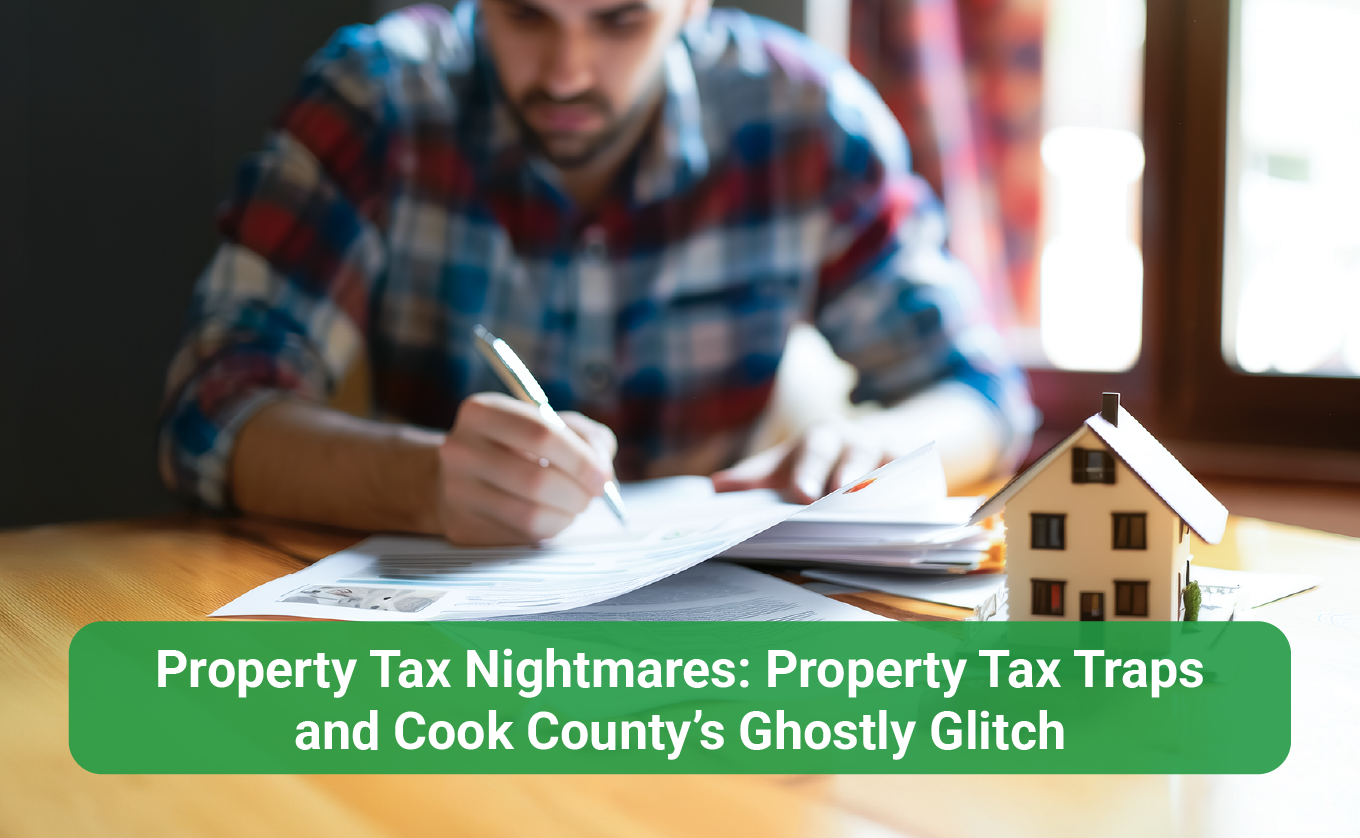
Like a haunted house, property taxes can creep up and surprise you if you are not prepared. Many Illinois property owners may not understand how crucial it is to be aware of the many property tax traps, and they may not know where to begin. Property owners can face unexpected costs due to missing exemptions, ignoring reassessment notices, misunderstanding payment installments, and any unforeseen technical glitches in the county’s computer system.
The Disappearing Act of Missed Exemptions
Exemptions are reductions in the taxable value of your home that can lower the amount of property taxes you owe. Exemptions don’t reduce the tax rate but reduce a portion of your property’s value that is taxed. There are many exemptions available for Illinois property owners, and eligibility can vary based on the county your property is in. It is best to check your designated county website for eligibility requirements. The following are the most applied for exemptions:
- Homeowner Exemption
- Senior Citizen Exemption
- Senior Freeze Exemption
- Disabled Persons Exemption
- Disabled Veterans Exemption
- Returning Veterans Exemptions
- Longtime Homeowner Exemption
On average, depending on the exemption, you can save anywhere from $500 to thousands of dollars in property tax reductions. Missing property tax exemptions can lead to some scary consequences. If you don’t apply, renew, or properly claim your exemption, it can lead to higher tax bills, missed refunds, potential risk in escrow accounts, and reduced eligibility for other relief programs. To avoid future financial strain, you must check and apply through your county assessor’s office for an exemption.
The Jump Scare of Ignoring Reassessment Notices
In Illinois, property reassessments are handled differently and are somewhat unique. Most counties outside of Cook County follow a four-year reassessment cycle, otherwise known as “quadrennial reassessment.” This means that all properties are reassessed once every four years. It is important to note that even within the counties, assessments can be carried out by a township assessor.
In Cook County, property values are assessed on a three-year cycle, known as “triennial reassessment,” to help assessments keep in line with current market conditions. The county is divided into three regions: The city of Chicago, north suburbs, and south suburbs. Every property in the county is reassessed once every three years and each year, one of the three regions is reassessed.
Failing to review or appeal your property tax assessment can be costly. Property owners run the risk of overpaying on property taxes, unequal assessments compared to other homes, reduced eligibility for certain exemptions and relief, higher mortgage payments, and lost opportunity for refunds. Ignoring your reassessment notice can result in higher tax bills due to possible inflated property values.
If your property is in Cook County, a high assessment can lock you into overpaying for three years straight unless you act by reviewing your assessment and appealing. To avoid the consequences of ignoring or forgetting your reassessment notice, check your mail or county’s assessor’s office site, mark your township’s reassessment year, and review your notice as soon as possible.
Misunderstanding Installments Can Lead to Surprising Endings

For property owners outside of Cook County, most counties follow a semi-annual or bi-installment schedule for property tax payments. Normally, property taxes are paid in two installments with the first being due around June and the second on September, depending on the county and township. Interests and penalties also vary by county so be sure to check your county treasurer or collector site, as well as the Illinois Department of revenue site.
Similarly in Cook County, they have a two-installment payment system for property taxes. The first installment is usually due March 1 of every year, and it is set at 55% of the previous year’s total property tax bill. Fortunately for homeowners, this means that the first tax bill is predictable. However, the same isn’t necessarily true for the second installment. The second installment is due later in the year, usually summer or fall, but exact due dates vary depending on township and sometimes can be delayed. Unlike the first installment, the second installment l is calculated using the current year’s tax rates, exemptions, equalization factor, and assessments. Missing exemptions or not appealing on time can lead to a shockingly high second installment bill. Just because the first installment is based on last year’s bill, don’t underestimate how costly the second installment can be, and it might increase if reassessments or tax rates rise.
Late payments come with unfortunate consequences. For instance, interest, and penalties (9% annually or 0.75% per month of interest), additional costs may be incurred (collections or other administrative costs), risk of losing your property, equity loss, and it may affect your credit score and ability to sell or refinance.
The following are some helpful tips to pay the installments on time:
- Set a budget and break payments into smaller savings goals
- Plan for increases in tax rates
- Mark the due dates on your calendar and set up reminders
- Sign up for electronic billing and automate payments when possible
- Double-check your mortgage escrow
- Apply for exemptions or appeal
- Use the many payment options
Property tax payments can be costly, but missing installments can lead to greater consequences, so be sure to stay up to date on due dates and regularly visit your county’s treasurer’s site.
Ghostly Glitch: Cook County’s Computer System Woes
Over the past years, Cook County has had some computer system failures, popularly known as the “ghost in the machine” debacle. Due to outdated tech, data errors, delayed bills, and more, homeowners in Chicago have lost faith in their computer systems. The issues first began in 2014 with a proposal submitted by Tyler Technologies to modernize Cook County’s property tax systems. The issues with the county’s computer systems have been ongoing, with problems ranging from outdated tech, data integration issues, accuracy and timeliness of tax bills, and constant fixes. Currently, Cook County has launched the “Property Tax System Daily Progress Tracker” to give homeowners transparency and accountability. However, even with the tracker, their expected deadlines are still an issue with many listed as TBD. The glitches in the system have affected homeowners greatly due to delayed or confusing tax bills, surprise payment deadlines, refund delays, and errors in assessments. The modernization of technology can come with benefits and advantages, but as illustrated through the county’s efforts, it can also come with haunting consequences. By not staying on top of your assessments, exemptions, and tax bills, you run the risk of overpaying or missing deadlines, which can lead to financial strain.
How to Protect Yourself from Property Tax Nightmares
Despite the web of tax traps, there are plenty of ways you can protect yourself now and better prepare:
- Apply for eligible exemptions every year
- Review your assessment notice right away and file an appeal if necessary
- Mark your calendars and budget for the installments
- Use your designated Treasure’s website to track deadlines
- If in Cook County, stay informed on system updates and use their Property Tax System Daily Progress Tracker
Don’t Get Spooked, O’Connor Can Help
With proper and timely preparation, you can avoid the horrors of penalties and interest from missing installment deadlines, ignoring reassessments, and other factors. Taxes can be scary, but you don’t have to go at it alone. Get help from O’Connor’s team of experts to serve all your property tax needs. As one of the nation’s largest tax consulting firms in the U.S. and with the most extensive proprietary property databases, our team serves a diverse clientele. With an office in Aurora, Illinois and over 185,000 clients across dozens of states, our team has the expertise and experience to help you at every step of the process, whether that’s reviewing your reassessment, coordinating an appeal, or help in understanding how Illinois property taxes work.

